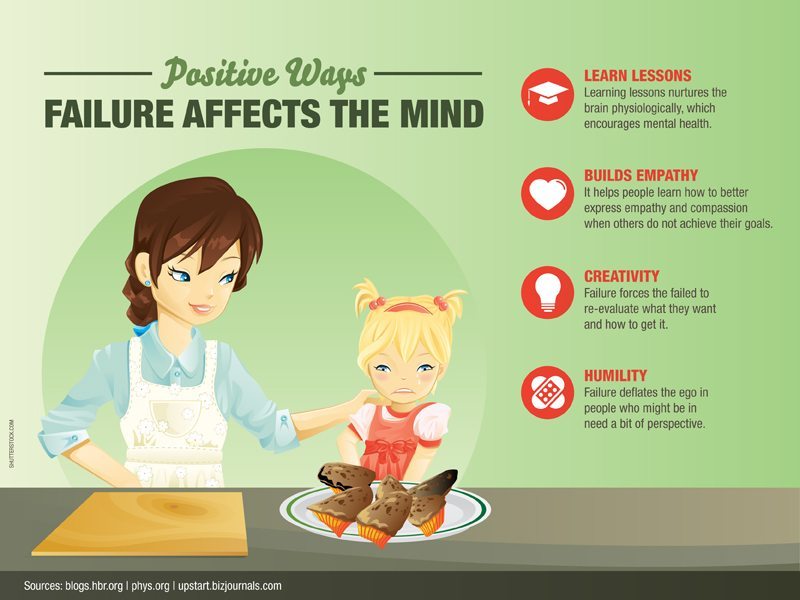8 Reasons Failure Can Be A Good Thing
by Staff Writers
Anyone even passingly familiar with Facebook knows everyone tends to live a life of great success (right?), while failure is just that thing Larry David and Louis C.K. have managed to wring gratifying careers from but everyone else avoids.
Honestly, though, aiming for the stars and ending up in Robocop’s Detroit instead ought not be construed as a shameful experience. Most (not all, of course) failures actually come bundled with some pretty amazing benefits. So stand up, apologize to any hurt parties (that’s kind of important), and consider the following a reason to try again in a new way or sculpt a new goal entirely.
8 Reasons Failure Can Be A Good Thing
-
Learn Lessons
Generic? Absolutely. But the usual life coachy platitudes about how failure might prove totally radical actually enjoy some scientific backing. Learning lessons nurtures the brain physiologically, staving off the encroachment of dementia and encouraging greater mental health. Since every failure obviously means a unique set of circumstances, the takeaway differs from individual to individual. But the brain benefits largely remain the same. It’s still probably not a good idea to set out and intentionally not-succeed at something just to start packing on the grey matter, of course.
-
You Work Harder
The most successful individuals so often cite instances of great failure as their major inspiration to start striving toward achieving their goals with even more devotion. Celebrating small accomplishments along the way helps bolster confidence, which may not cure depression but can still put a dent in everyday emotional blips. Shutting down after a serious failure makes sense, because people do need an opportunity to process the pain and analyze their mistakes and how to address them later. Once they finally reboot, though, the truly motivated types approach their future endeavors with renewed vigor. That’s a positive thing!
-
It Builds Empathy
Experiencing failure provides people with an opportunity to learn how to better express empathy and compassion when others do not achieve their goals. In building love, the brain builds oxytocin, which – in obviously scientific terms – fosters warm fuzzies. No matter what Gordon Gekko espoused about greed, generosity stands as an essential characteristic in a life worth living. Once attaining success, keep that ego in check and reach out to other honest, hardworking folks looking for opportunity. And speaking of ego…
-
Gain A Sense of Humility
Success is great. Narcissism, though? Not so much. Failure might sting, but it deflates the ego in people who might need a wee bit of perspective. Humility makes it easy to maneuver future failures (yes, Virginia, there will be future failures) and establish mutually gratifying connections with other people. And setting up an amazing support network of tender, loving people obviously leads to some well-known (and obvious) mental health benefits.
-
You Can Find Out Who Your Friends Are
A well-worn tale of rises and falls (and maybe a rise, depending) always involves the protagonist ditching the loyal and supportive friends in favor of suck-ups, groupies, and other assorted hangers-on. But once the hype bursts and the negative criticism starts seeping in, the new-found love manages to dissipate along with it. And the musician or actor or comic book artist or whomever has to come crawling back to the original set of friends and apologize for acting like such a loser. Because real buddies and pals and amigos and chums stick around and show love and support when things start crumbling. Which, as we’ve said before, makes all the difference in one’s overall mental health.
-
A Chance For Simplicity
Billionaire author J.K. Rowling launched her Harry Potter empire as a suicidally-depressed, impoverished single mother entrenched in anxiety over perceived failures. She devoted her address to Harvard’s Alumni Association to what she learned from such a wrenching, emotional period. The writer covered many of the more common positives about not achieving goals, but one overlooked benefit in particular stood out. As Rowling points out, the experience forced her to analyze what was and was not important in her life. Streamlining and simplifying keep the brain organized and focused when standing up and moving forward.
-
An Increased Demand For Creativity
To paraphrase (butcher) Albert Einstein, insanity happens when repeating the same mistakes over and over and over again with the expectation that something changes. Failure forces the failed to re-evaluate what they want and how to get it (assuming their goals remain reasonable), exercising the creative sections of the brain in the process. By this point, everyone knows that occupying and challenging one of the most essential organs holds some pretty amazing cognitive and emotional pluses! Creativity is no exception.
-
Flexibility!
Flexibility stands as yet another essential life skill. Sticking within rigid boundaries and behaviors might mean precluding progress and success. One thing failure might teach involves how to approach problem-solving from a number of different angles as well as better navigating challenges as they present themselves. Save for the truly spoiled among the populace, the most successful of individuals understand how to work hard and flex their way around whatever life throws at them. Unreasonable people just kind of try and force everything to fit into their little preconceived boxes. Arbitrary preconceived boxes, not ones that legitimately improve the world.

